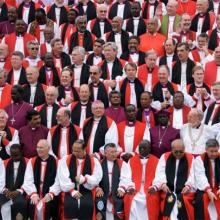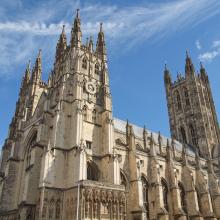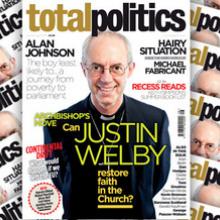Archbishop Justin Welby
John, a 64-year-old theologian and dean of St. Albans Cathedral, has made no secret of his own homosexuality, and is in a civil partnership with another priest, a relationship he says is celibate. He has also made clear his support for same-sex marriage.
That has made John the subject of hard-liners’ ire. Supporters say his honesty about his homosexuality, and his views about same-sex marriage, have cost him the bishop’s seat, while some other bishops are known to be “quietly gay.”

Giovanni G/Shutterstock.com
Nicholas Chamberlain, the bishop of Grantham, has come out as the first Church of England bishop to openly acknowledge he is gay. Chamberlain, 52, said in an interview with the Guardian published Sept. 2 that he is living with a man and in a long term loving relationship, though it does not involve sex.
The Guardian predicted that Chamberlain’s announcement “will be embraced by campaigners for equality but is likely to alarm conservatives who fear the church is moving away from traditional teachings.”

Image via REUTERS / Mark Blinch / RNS
Canada’s Anglican Church has provisionally voted to amend its rules to allow clergy to celebrate same-sex marriages, a day after it narrowly defeated the measure.
The General Synod will hold a second reading on the measure in 2019. If it passes, the Canadian church will join the Episcopal Church, which formally approved marriage ceremonies regardless of gender in 2015. As a consequence, the Anglican Communion placed temporary restrictions on the Episcopal Church.
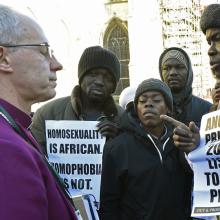
Archbishop Justin Welby with protesters. Image via REUTERS/Toby Melville/RNS
The Anglican Communion’s worldwide leaders, finishing up four days of heated discussions, sought to project a sense of unity despite a move to exclude the Episcopal Church from key policy decisions over the American province’s acceptance of same-sex marriage. The Archbishop of Canterbury, Justin Welby, overall leader of the global body, stressed at a news conference on Jan. 15 that the church had chosen to remain together, albeit effectively as a house divided.

Image via Anglican Communion News Service / The Press Association / RNS
Various factions within the Anglican Communion are jockeying for position as bishops of the world’s third-largest Christian tradition gather in Canterbury for the start of a six-day meeting to discuss the future of their communion.
But averting a split may not be possible.
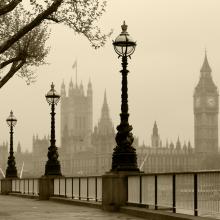
Image via tkemot / Shutterstock.com
The British government is launching an independent five-year inquiry under the leadership of a prominent New Zealand-born jurist to examine whether private and public institutions, including churches, failed to protect children from sex abuse.
At a news conference in London on Nov. 27, Justice Lowell Goddard, who will head the inquiry, said the investigation would focus on high-profile allegations of child abuse involving current or former members of Parliament, senior civil servants, and government advisers.
Archbishop of Canterbury Justin Welby asked Goddard to investigate the Church of England first, saying that he would order his own inquiry if there was a lengthy delay, the Anglican Communion News Service reported.
In a lengthy interview in The Times of London, Archbishop of Canterbury Justin Welby predicted that the Anglican Communion might not hold together because of strong disagreements on the ordination of women as bishops and full rights for LGBT people.
The candid interview came at the end of Welby’s visits to the 38 provinces (or country-states) that make up the Anglican Communion.
Welby said that although individual churches remain “strong, resilient and thriving,” the differences among them remain profound.
“I think, realistically, we‘ve got to say that despite all efforts there is a possibility that we will not hold together, or not hold together for a while,” he said. “I could see circumstances in which there could be people moving apart and then coming back together, depending on what else happens.”
Rod Thomas, chairman of Reform, an evangelical network of English and Irish Anglicans opposed to women bishops and LGBT ordination or unions, agreed with the archbishop’s assessment.
“If, as an Anglican, you believe more or less the same things but you just can’t reach agreement on something that is terribly divisive, you do go your separate ways. That will mean that the heads of various Anglican churches around the world won’t be able to meet together and say ‘Look, we’re all united’ in the same way they did in the past.”
Archbishop of Canterbury Justin Welby said he was embarrassed and irritated following revelations that the Church of England has invested millions of pounds in a company that financially backs England’s leading payday lending company, Wonga.
Welby told the BBC: “We must find out why this happened and then make sure that it never happens again.”
The Financial Times broke the news that the Church of England invested several million pounds in Accel Partners, the U.S. venture capital company that led to the launch of Wonga, which dominates the 2 billion pound payday lending market in England. Wonga charges annual percentage rates of more than 5,000 percent.
Leading secularists are calling on nonreligious parents to fight a government effort that would allow the Church of England to run thousands of state schools.
The schools, or academies, would be privately funded, quasi-independent and accountable to the church for their curricula, organization, admission policies, and teachers’ pay and conditions.
As of July, there were 3,049 such academies operating in England, many financed by businessmen, finance companies, supermarkets, football clubs, and a growing number of faith-based organizations including the Roman Catholic Church, the Methodist Church and the largest of all — the Church of England.
“It is a commonplace that the job of Archbishop of Canterbury is one you wouldn't wish on [even] your most antagonistic blogger,” quips Samuel Wells, Vicar of St. Martin-in-the-Fields in London.
This sense of humor about the office extends to the new leader of the Church of England himself. “[O]nly 40 percent of churchgoers are convinced that the new Archbishop of Canterbury can resolve the problems of the Church of England. I do hope that means the other 60 percent thought the idea so barking mad that they did not answer the question,” said Justin Welby in his first Easter sermon last month.
But the question is a valid one. Welby certainly has his work cut out for him. The Anglican Church, splintered by years of division over questions of homosexuality, same-sex marriage and women’s leadership in the church, faces an uphill road to reconciliation.
